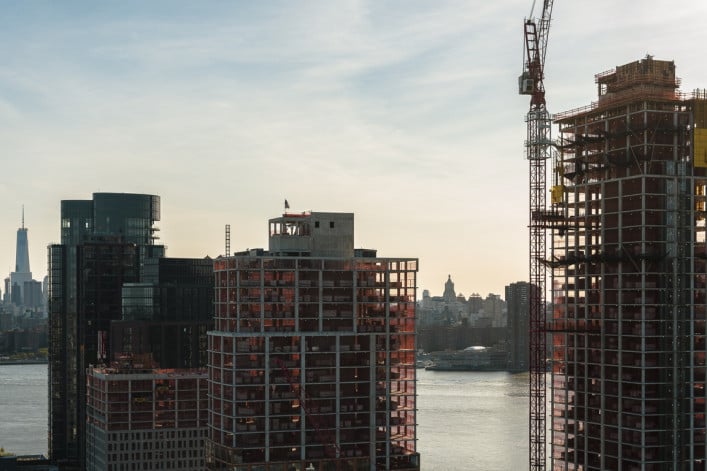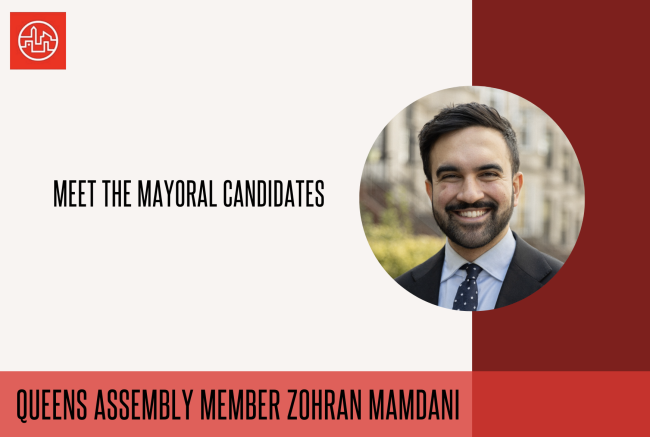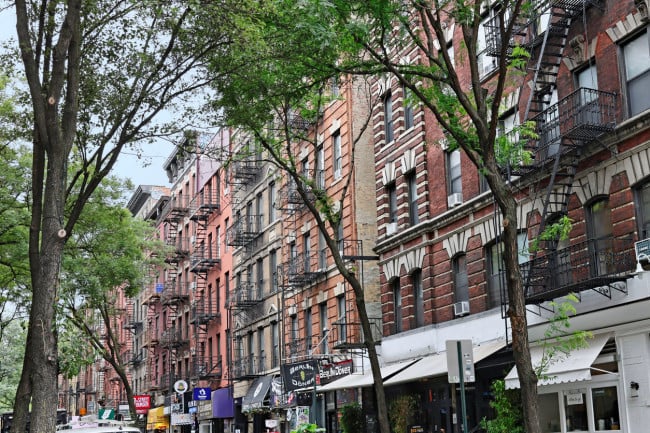Whoever wins the NYC mayor’s race faces a worsening housing crisis, affordable developers say
- If elected, Mamdani, Cuomo, or Sliwa will inherit tougher economic conditions including tariffs and federal cuts
- Developers hope a new mayor will push taller, speedier projects across NYC and offer greater subsidies

Affordable housing developers hope to build bigger, faster, and taller under a new NYC mayor. But tariffs and federal funding cuts are putting up new roadblocks to housing.
iStock
New York City’s affordable housing developers are gearing up to build under a new mayor, but they warn that economic conditions and federal cuts are turning new developments into Sisyphean battles.
Unpredictable tariffs, still-high interest rates, and looming cuts to federal housing assistance all threaten new construction in NYC. While developers say they’re ready to work with whoever wins the mayoral election this November, they warn that a new mayor—either Democratic frontrunner Zohran Mamdani, ex-Governor Andrew Cuomo, or perennial Republican candidate Curtis Sliwa—should expect serious challenges to building housing.
“That uncertainty in construction, in tariffs, in regulation, and in the federal government—all of that is creating an environment that is very counter to the the direction and eagerness to resolve our affordability issues,” said Spencer Levine, president of RAL Companies, which has built affordable and market-rate residential developments in NYC.
At the same time, whoever succeeds Mayor Eric Adams will inherit a few key advantages: a city drastically rezoned by City of Yes, which will broadly allow for more housing development, faster pathways for affordable construction (if three November ballot measures pass), and a political environment keen on building NYC out of a housing crisis.
Affordable developers hope a new mayor will capitalize on that momentum by making it easier for them to build bigger, faster, and with greater government subsidies, four development firm leaders told Brick Underground. (Representatives for Mamdani and Cuomo did not respond to questions about their respective housing plans.)
“The key to build more is you need to build higher,” said Dave Walsh, head of housing development at the nonprofit Breaking Ground, which builds and runs supportive housing for New Yorkers. “It’s critical for the continued efforts on the rezonings to continue. Because that’s one of the fundamental keys to getting more housing built.”
Building bigger, faster
Developers applauded both Mamdani and Cuomo for championing rezonings in their housing plans. Mamdani’s plans to eliminate parking mandates would also help speed development by reducing costs, said David Schwartz, co-founder of affordable and market-rate developer Slate Property Group. (Schwartz estimated in an op-ed that every parking space adds $50,000 to $100,000 to the cost of a new building.)
Kieran Harrington, CEO at RiseBoro, also praised Mamdani’s commitment to hiring more city staffers to speed up approvals of new buildings, particularly in the city’s Housing Preservation and Development department (HPD). Or, as Walsh put it, “to fast track a project, you need someone on the other end of the phone.”
“The challenge is getting HPD to a place where it's really funded and staffed so that it could be operating at its full potential,” Harrington said. “Zohran understands that, and if he is elected mayor, I think that he’s going to pay attention to that aspect to ensure that we are able to keep up with the demand for new housing.”
Who’s picking up the check?
But the biggest obstacle facing affordable housing is not that the city is short-staffed; it’s short on cash, Schwartz said.
“The city definitively has more good affordable housing projects than they can fund, because they don't have the money to do it,” Schwartz said. “Without more money, more staff's not going to help them get it done.”
Funding is set to be a major sticking point in the next mayoral administration. Tariffs on lumber, steel, kitchen cabinets, and other materials will make it significantly more expensive to construct new homes, according to a report from the Brookings Institute. Plus, President Donald Trump’s changes to federal housing assistance could be catastrophic for owners and tenants.
In NYC, roughly 34,000 landlords rely on federally-funded Section 8 housing vouchers, which pay part of a tenant’s rent, according to a July report from the New York City Housing Conference (NYCHC).
NYCHC warns that Trump’s proposed restrictions to Section 8 and other programs would likely result in “widespread homelessness” and “multi-family mortgage defaults and banking instability,” particularly in rent-stabilized buildings, where owners are already warning about an inability to maintain their buildings.
The city and state could make up the gap by offering additional subsidies, tax abatements, and investing in mixed-income housing, Schwartz said. But that might not be enough to cover the loss of federal funding, even for Mamdani, who pitched raising taxes and the municipal bond limit to fund more housing (for which he’d need state approval).
“Let’s not sugarcoat it,” Schwartz said. “The market forces are against us.”
A long road to rent relief
Those market forces will limit the amount of housing developers can build, though they’ll benefit from City of Yes and a handful of other major rezonings accomplished by the Adams administration.
A tough economic climate puts new housing further out of reach of the New Yorkers that need it (though current rent-stabilized tenants could benefit from a rent freeze if Mamdani is elected). More than half of all NYC households are rent burdened, meaning they pay more than 30 percent of their income towards rent, according to a 2024 report from Comptroller Brad Lander.
But Schwartz and other development firm heads were optimistic that with the right combination of subsidies and zoning, NYC could build its way out of a housing crisis.
“Most of the developers that are involved in our business are truly committed, and we have truly committed government partners that are doing the best they can,” Walsh said.
A tough market is also providing a common enemy for developers, some of whom initially panicked at the prospect of a Mamdani mayoralty. While not everyone is necessarily “warming to the idea” of a Mamdani administration, developers are willing to work with anyone to build, Levine said. And to his credit, the Mamdani campaign realizes the city is in a housing crisis, Schwartz added.
“We need to all work together to do this,” Schwartz said. “Something has to be done, because I think the future of New York is riding on this.”





























